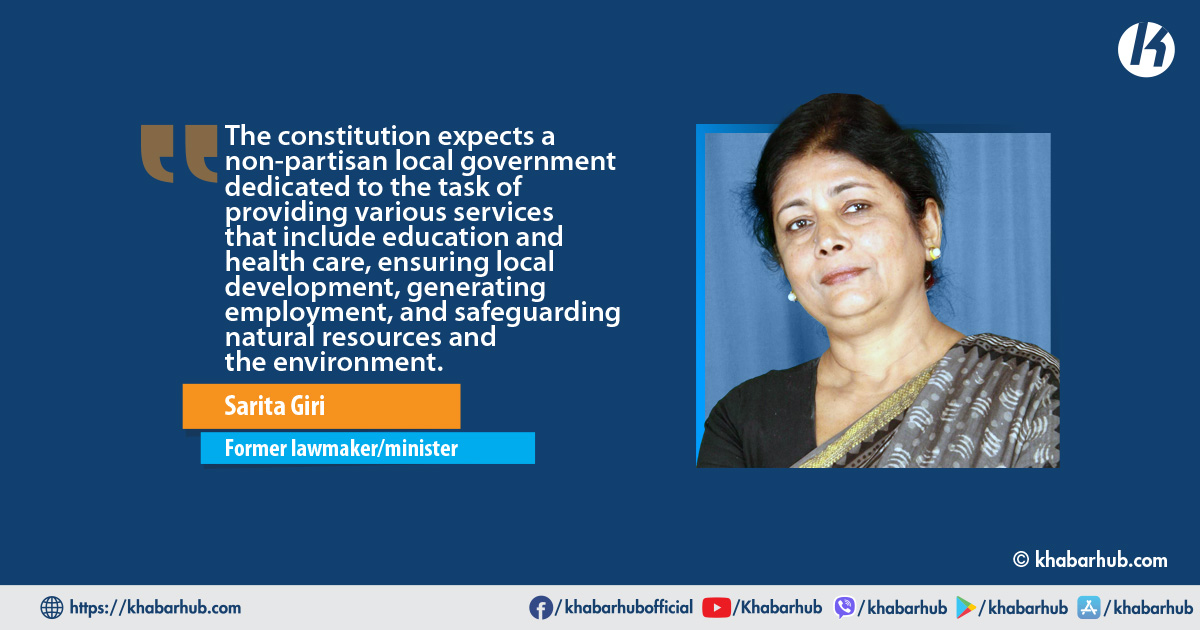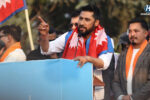Modern Nepal was founded in the year 1768 BS. A highly centralized government had remained a constant feature of the state of Nepal since the modern state was founded.
A federal republic constitution promulgated in 2072 marks a departure from the old centralized system of governance to federalism. The country has been carved into seven provincial units under the current constitution. Simultaneously the country has 753 constitutional local self-government units. These local self-governments, according to the constitution, are autonomous. These local bodies derive their authority from the constitution itself. The institutions of republicanism, federalism, and local self-government are incorporated into the constitution for ensuring progressive and participatory democracy at all levels.
Before a centralized Nepal was founded, common people lived in parcels and pockets and on the ridges of the rough and rugged Himalayan land. People lived in the valleys that were carved by the mighty ridges and the stormy water flows of the gigantic Himalayas.
The cliffs, ridges and the gorges of the Himalayas had created the conditions of a kind of localized communitarian life for numerous local level units.
Then there exist other larger units too known as principalities or kingdoms. The kings ruled over their kingdom with the help of
the representatives appointed by them and the local rulers. But when modern Nepal was founded, people had to face innumerable difficulties whenever an authority of a highly centralized state came to them in place of their local rulers.
People at the grass-root believe that the allocated money is not being used for development work and has been diverted for other purposes with the consent of political parties leaders. Thus the local bodies are emerging as new centers for a vicious cycle of corruption.
The overbearing power of the state was felt by local people when they realized that they had to depend upon the authority of the new state even to prove their existence.
Afterward, under the 2046 constitution which came into force after the restoration of democracy, a decentralization act was passed by the parliament and nearly 4000 local government units were formed.
In those units, people voted to choose their representatives on a party basis. The local governments had administrative power delegated from the central government under the
decentralization scheme. The center had the right to dissolve local governments as and when it would find necessary. Historically, local governments known as Panchali had existed in the Malla and Lichchavi periods too.
The 2072 constitution provides for 753 autonomous local self-government units. The constitution defines the power and duties of the local governments.
By and large, they do not have to depend upon the central government for access to the resources and the authority to rule. The parliament allocates a budget for the functioning of the local governments every year.
The constitution has envisioned the local government as the government of the community, for the community by the community.
However, the community given the constitution does not consist of families or caste, or ethnic groups. Its conception of community is that of a territorial unit consisting of individuals with the right to choose their representatives with their single vote.
The constitution expects a non-partisan local government dedicated to the task of providing various services that include education and health care, ensuring local development, generating employment, and safeguarding natural resources and the environment.
Ironically, the first local government election was fought on a partisan basis and now the election commission is preparing to hold the 2nd partisan local election on Baisakh 29 of the year 2079.
Certain questions arise in the face of these events. How is all this happening? What is legalizing a partisan local government’s election?
A civil society movement is emerging against the partisan local level elections. But arguing and advocating for independent candidates is not enough to empower people and strengthen democracy at the local level.
To understand the complexities we should first pay attention to the code of conduct issued by the election commission for local elections.
The election commission bars political parties from campaigning with party flags whereas it allows the voters to cast their votes on party symbols on the ballot paper.
This is contradictory in itself and the roots of this contradiction lie in the existing laws. Meanwhile, people are not barred from contesting elections as independent candidates. But there are five positions to be elected in every local unit.
The independents cannot form a panel or a group with the same symbol to contest the elections in any unit. The election commission will issue a different symbol to every independent candidate.
On one hand, the symbol of a party keeps the five proposed party candidates in unity or together in a group whereas the five independent members of a panel in any local unit are divided by five different symbols. Thus independent candidates are put in a disadvantageous or weaker position.
People are realizing that their votes and their right to choose their representatives are not going to have any worth as their representatives would be selected and elected by the political parties.
People are feeling helpless and bewildered and a kind of chaos is hovering over the confusion on the ground. People are finding it difficult to understand whom and whose agenda are they going to vote for.
People are also talking that gathabandhan or maha gathabandhan for local elections as a prelude to nonpartisan local elections.
What has gone wrong?
The parliament has passed laws for the political parties and the act has stipulated that political parties will have their organizational units only up to the provincial level.
The law does not mention nor recognize the existence of a political party organization at the local level for local elections.
However, the electoral laws made by the election commission have enabled the political parties to select party candidates for the election. This is obviously a violation of the constitution and it works against grass-root democracy.
However political parties are maintaining a silence about the flawed electoral laws made by the election commission. It can be inferred that political parties and election commissions, both are responsible for the present erroneous situation.
It is now becoming clear that the centralizing character of the state of Nepal still exists. Presently political parties are working in an extra-constitutional manner as the centralizing machinery against the letter and the spirit of the constitution.
Organizing elections at local levels on a party basis as well as in party alliance is an infringement of the rights of the people to choose their representatives in a free and fair manner.
If one goes by the number of votes, a candidate backed by the might of a four-party alliance will be all too heavy for other candidates including the independent ones. The essential purpose of the local election is defeated. This is a grand manipulation of democracy.
Manipulation against democracy:
The five parties in government have not taken a step to correct the legal flaws. Instead, they are constantly putting in their efforts to consolidate the electoral alliance to capture the local bodies and affect the provincial and federal elections.
The ballot paper is also designed in a way that an overwhelming population is unable to remember and find the symbols of the candidates on the ballot paper if they do not favor party members as their representatives.
Its design makes it more convenient for the people to cast their votes on party symbols rather than searching for the symbol of the independent candidate of their choice.
To ensure strong local democracy, the right step would have been to ask the election commission to rectify the laws and issue an ordinance, if needed, for a nonpartisan local election, and to make the voting ballot paper and its procedure simple and comprehensible.
But the parties in government have refrained from taking on the right steps. Instead, their leaders are working day and night to strengthen electoral alliances to capture local units against democracy. The reasons are both political and financial.
The present constitution has made local self-government very powerful in terms of access to resources and authority.
The local units are placed under the central government and not under the provinces in which they are located. This is against federalism and has been done to weaken the provincial governments.
The major political parties were against strong provincial units when the constitution was being drafted because that would have been a serious challenge to centralizing tendencies and practices of the state.
The other reason behind the making of the maha gathabandhan , is the alliance of the pol. Parties in the government could be the possibility of enhancing political control over the local units and encouraging collusion to corruption at the local level.
It is rather a source of conflict at the grass-root level which politicizes everything under the sky at a local level unit and polarization on the basis of political parties kills the communitarian spirit that the constitution expects to awake at the community level for peace and development of all.
The general perception is that local governments have become new centers of corruption. The center has not been able to control or curb corruption at the local level. In fact, local bodies are alleged to work as new conduits to siphon the allocated money for development work elsewhere for other purposes.
People at the grass-root believe that the allocated money is not being used for development work and has been diverted for other purposes with the consent of political parties leaders. Thus the local bodies are emerging as new centers for a vicious cycle of corruption.
The politics of Mahagathbandhan is a step towards the consolidation of corruption on the basis of bhagbanda. This is going to make good governance a distant daydream and could be the beginning of the criminalization of politics at the local level.
A new debate for independent candidates:
As the day for 2nd local level elections is getting closer, a big debate is emerging as to how to make the local bodies and local people autonomous in the real sense.
A civil society movement is emerging against the partisan local level elections. But arguing and advocating for independent candidates is not enough to empower people and strengthen democracy at the local level.
The two goals of empowering people and strengthening local democracy are interdependent and will be progress towards achieving both the goals if local elections are made nonpartisan and electoral laws are reformed simultaneously.
Reforming local government election laws is necessary so that the election procedure is made simple and comprehensible to all.
Local self-governments are primarily meant for development and democracy. They are not policy-making bodies.
Thus their election on a partisan basis does not make any sense for grass root people. It is rather a source of conflict at the grass-root level which politicizes everything under the sky at a local level unit and polarization on the basis of political parties kills the communitarian spirit that the constitution expects to awake at the community level for peace and development of all.









Comment